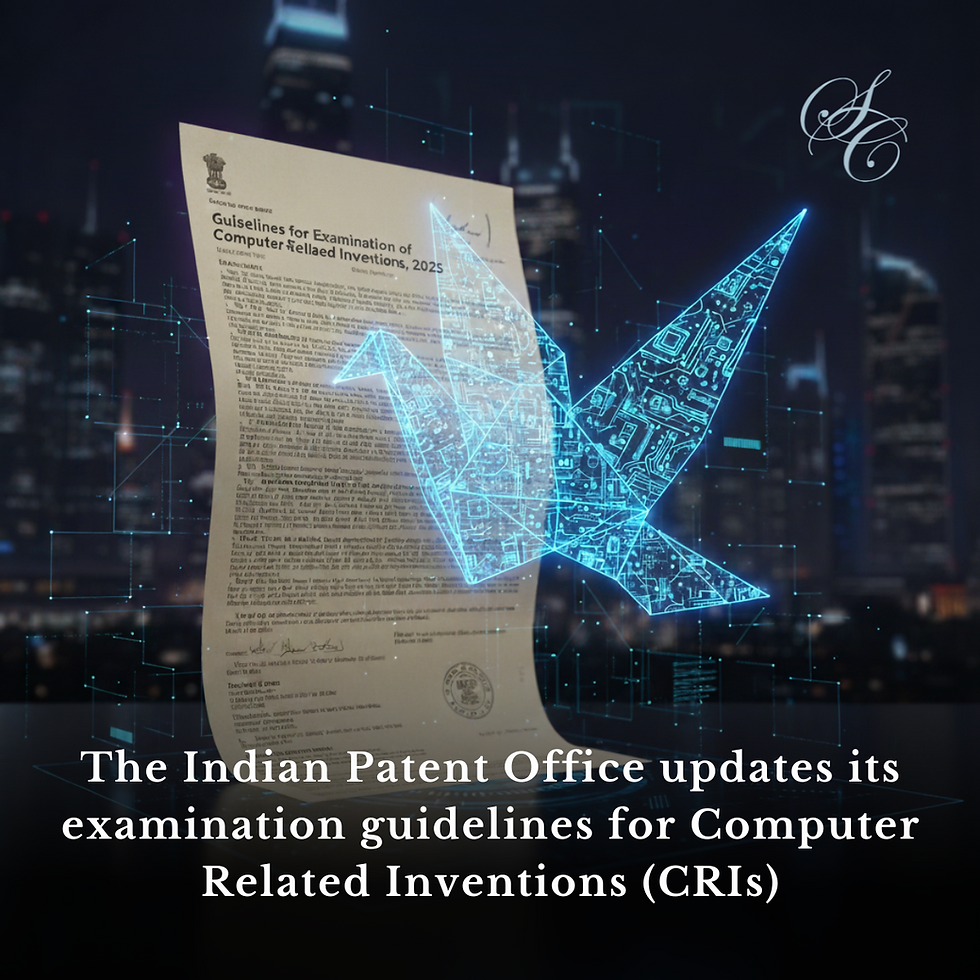Analyzing the concept of IPRs in creations of AI – Part 3: Some major questions
- Sarwajeet Singh
- Mar 1, 2022
- 5 min read
This post is the penultimate part of the four-part series on Artificial Intelligence (“AI”) and its affair with Intellectual Property (“IP”) Law. The first and second part of the article series can be accessed here and here. From a theoretical point of view, providing IP rights to creations of AI might seems possible. The recent discussion around the world points towards such possibilities. However, the concept, from a practical point of view, needs to answer many questions before implementation.
One of the most prominent questions while considering the grant of IP rights for works created by AI is the determination of the party who will hold and utilize such rights. Unless and until commercially used, the purpose of providing IP protection to any creation will not be fulfilled. In case of AI, the creation can be only utilized by a human being, as the purpose of an AI itself is to assist humans. Nevertheless, considering a situation, where an autonomous AI creates an IP, the determination of who may utilize it, unless it is considered just akin to computer generated[1] work, poses serious dilemmas. The relation between such AI, which may have created the work autonomously and a human being cannot be considered under the traditional concepts of law. While statutes have considered the possibility of difference between the creator of an IP and the owner of the IP, and have provided for determination of rights between such parties[2], such determination is based on the contractual nature of the relationship between the parties. In the case of an AI, it cannot be said that such relations can be created, as AI lack the inherent capacity to be a part of valid contracts.[3]
The field of copyright possesses its own specific set of challenges while looking into creations by AI. Moral rights are one such aspect. Moral rights are an incentive for authors to create more works. However, these incentives or attribution is not necessary for an AI to create any work.[4] Further, it cannot be said that there will be creative effort, rather than pre-loaded codes, that enables an AI to create a work that can be considered under scope of copyright laws. In addition to this, merely recognizing minimal intervention of a human, who does not assist in actual creation of the end result, for the sake of providing copyright, might lead to lowering the incentives that humans have to create a work. Further, providing identical protection to works of an AI as that of humans is also a question to be considered.
Interestingly, there have been instances where courts have denied moral rights of non-human authors, as laws do not provide for such rights.[5] Even setting the moral rights issues aside, the originality element of works is another challenge. Considering the march of law from ‘sweat of the brow’ to ‘modicum of creativity’, a detailed analysis might be necessary to ascertain the level of originality in the spectrum, that may qualify the work generated by AI for copyright protection. Nevertheless, courts have previously interpreted laws and observed that copyright cannot be attributed to a work unless the human element is present, even though the work in itself may be original.[6]
Another issue that has to be answered is the enforcement of rights in a work created by an AI. Unless the concept of originality and authorship is not clarified, enforcement of rights in works of AI might not be possible. Defence of not having originality in the work will be the prime ground taken by infringers of rights in works generated by AI. Further, considering the fact that by questioning human intervention in works created by AI, especially when it is autonomously generated, infringers might be able to escape liability. While considering the aspect of human intervention for providing IP rights is important, it is equally important to remember that the purpose of investing in development of AI that can autonomously generate work will be defeated, if circumstance-based exceptions are not given.
In addition to the above, it is also pertinent to note that, works created by AI, also cannot be excluded from infringing the rights of a human author. In such a situation, who does the copyright owner take action against? Therefore, finding answers to such problems will be a challenge faced during the evolution of law.
Along with the above, interpretation of law as it stands, is likely to cause confusion vis a vis trade and utilization of works created by AI in different jurisdictions. As discussed previously, recent developments in different jurisdictions have been contradictory as regarding whether protection can be provided to creations of AI. Courts in the United States in many instances have observed the necessity of a human element while creating a work and hence works of AI are not protected in the US.[7] Courts in Singapore have also clearly laid down that identification of a human author is always necessary while providing copyright to a work.[8] On the other hand, Chinese and Australian courts have in a way accepted IP rights in creations of AI.[9] From the procedural point of view, while South Africa and Canada[10] have accepted rights of AI in its creations, United States of America, United Kingdom and European Union are of the opinion that such rights in creations of AI cannot exist in accordance with current statutes.[11] India even though, has accepted the co-authorship of AI and granted copyright protection, has recently initiated a suo moto procedure to withdraw the protection granted.[12] Hence such differences in the manner of interpretation in each jurisdiction is likely to create a hindrance towards harmonious protection of works created by AI.
In short, while grating protection to creations of AI can be a very progressive step and a boost to the industry, there are serious questions that must be answered before thinking about providing such protection. In the final part of this series, we will be providing some suggestions to resolve these issues.
[1] As of now, statutes consider the humans who causes the creation of such world to be considered as the first right holder of such computer generated work. See for eg: Section 2(d)(vi) of Copyright Act, 1957; Section 9(3), Copyright, Designs and Patents Act 1988
[2] See for eg: Section 17 of Copyright Act, 1957; Section 6(1)(b) of The Patents Act, 1970
[3] See Mik, Eliza, AI in Negotiating and Entering into Contracts (June 1, 2021). Chapter in forthcoming book edited by Larry DiMatteo “AI & Private Law”, Available at SSRN: https://ssrn.com/abstract=3873071
[4] Miernicki, M., Ng (Huang Ying), I. Artificial intelligence and moral rights. AI & Soc 36, 319–329 (2021). https://doi.org/10.1007/s00146-020-01027-6
[5] Syed Ahmad Jamal v Dato Bandar Kuala Lumpur [2011] 2 CLJ 569.
[6] Beijing Film Law Firm v. Baidu [2018] Beijing Internet Court, J0491MC. No. 239.
[7] See: Second Request for Reconsideration for Refusal to Register A Recent Entrance to Paradise (Correspondence ID 1-3ZPC6C3; SR # 1-7100387071), Available at: https://www.copyright.gov/rulings-filings/review-board/docs/a-recent-entrance-to-paradise.pdf
[8] Asia Pacific Publishing Pte Ltd v Pioneers & Leaders (Publishers) Pte Ltd [2011] SGCA 37
[10] Sarkar, S., 2022. Exclusive: AI co-author secures copyright registration in Canada. [online] Managing Intellectual Property. Available at: https://www.managingip.com/article/b1wnnqt30c2kll/exclusive-ai-co-author-secures-copyright-registration-in-canada
[11] Supar note 9.
[12] Sarkar, S., 2021. Exclusive: Indian Copyright Office issues withdrawal notice to AI co-author. [online] Managing Intellectual Property. Available at: https://www.managingip.com/article/b1vvyqphyskcrg/exclusive-indian-copyright-office-issues-withdrawal-notice-to-ai-co-author.See: Second Request for Reconsideration for Refusal to Register A Recent Entrance to Paradise (Correspondence ID 1-3ZPC6C3; SR # 1-7100387071), Available at: https://www.copyright.gov/rulings-filings/review-board/docs/a-recent-entrance-to-paradise.pdf




Comments